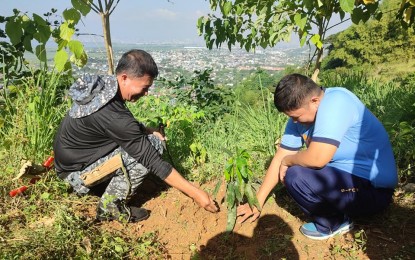
GREENING. Officers of the Binangonan Municipal Police Station lead a tree-planting activity at the Materials Recovery Facility of Barangay San Carlos on Jan. 6, 2024. The Department of Interior and Local Government is encouraging the over 42,000 villages in the country to plant fruit trees and vegetables. (Photo courtesy of Binangonan MPS Facebook)
MANILA – The Department of the Interior and Local Government (DILG) campaign to keep 42,000 villages nationwide clean and environment-friendly includes making communities self-reliant by planting fruit-bearing trees and vegetables.
DILG Undersecretary for Barangay Affairs Chito Valmocina said “Project Kalinisan (Cleanliness)” encourages planting and establishing backyard fishponds, he said at the Saturday News Forum in Quezon City.
“Ako naman dito sa Barangay Affairs, pinatututukan ni Secretary (Benhur Abalos) iyong paglilinis, pagtatanim, pagmi-maintain. Ang susi po noon ay kailangan talaga minu-monitor mo at sinu-supervise mo iyong mga punong barangay (We at the Barangay Affairs have been instructed by the Secretary to monitor cleaning, planting and maintenance. The key is monitoring and supervising village chiefs),” Valmocina said.
He said that out of the more than 42,000 barangay officials who won in last year’s polls, over 20,000 are newly elected.
Valmocina said 25,000 villages already have their own community gardens.
He said seedlings for 18 kinds of vegetables cost about PHP25.
“Kung ang bawat barangay, lalung-lalo na sa probinsiya, ay 300 families ang kanilang bibigyan ng seeds at saka seedlings ay PHP7,500 lang (If 300 families, especially in the provinces, are given seedlings, that’s only PHP7,500),” he said.
He said just about everybody can start planting in their backyards or even small spaces where plants can grow.
He recounted that as a long-time captain of Barangay Holy Spirit in Quezon City, they maintained backyard farms.
“Iyong mga constituent ko diyan, makikita ninyo nakalagay lang sa paso, sa balde, sa lata, sa kawayan, sa sako, kaya nakikinabang sila sa tanim na gulay. Ang mga eskuwelahan po diyan sa Quezon City, makikita ninyo, may mga tanim na gulay (My constituents have plant pots, pails, tin cans, bamboos and sacks [to grow plants] and they benefit from the vegetables. Schools in Quezon City have plants, too),” he said.
He said Quezon City Mayor Joy Belmonte will issue an ordinance to promote farming in Metro Manila’s biggest city.
Through a Jan. 3 memorandum released by the DILG, the "Kalinisan" program aims to raise awareness and encourage participation among Filipinos on environmental responsibility through proper solid waste management.
The program also encourages local government units to invest in programs, projects, and activities on solid waste management and ecological practices, as well as set up a recognition system for the cleanest LGUs.
“Let our barangays be the laboratory of workable ideas, a showcase of what we can achieve together, and proof that the basic government unit, the barangay, teems with best practices. Simulan po natin sa kaayusan at kalinisan (Let us start with order and cleanliness),” President Ferdinand R. Marcos Jr. said in his speech during the simultaneous nationwide launch on Jan. 6.
“Filipinos do not deserve dirty, dingy, or dark communities. Kaya kumilos tayo upang gawing maaliwalas at malinis ang ating kapaligiran. Dapat walang lugar, ni puwang, ang dumi, dugyot, at dilim sa ating pamayanan (So let's act to make our environment comfortable and clean. There should be no place, no space, for dirt, dust, and darkness in our community).” (PNA)
